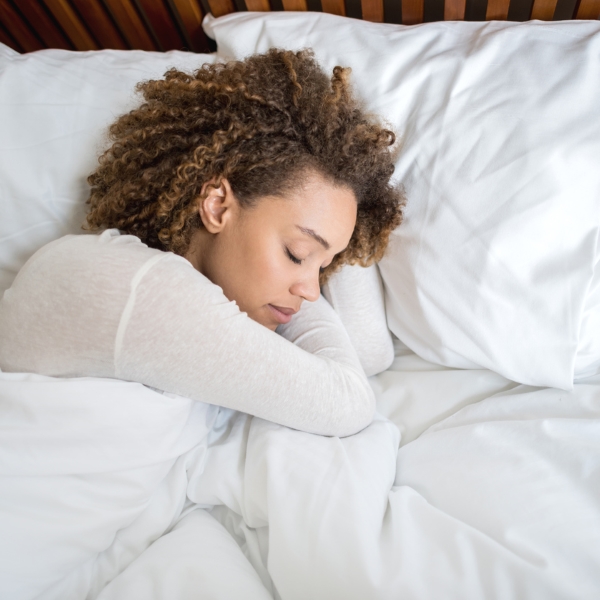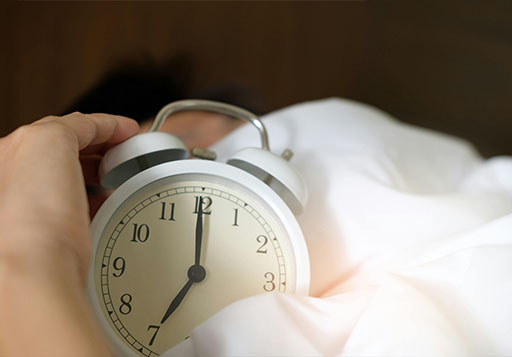How Long Should You Sleep For?

Author: Jonathan Warren
Eating your five a day, exercising regularly, brushing your teeth twice a day. These things are all actively considered to be great for your health - but this list is missing one of the most important things of all - sleep.
Getting the right amount of quality sleep is imperative to your overall good health, but it can be difficult to know both how much sleep you should get per night, and then how much sleep you’re actually getting.
From understanding why sleep is so important, to looking at the troubles from sleeping too much, by the end of this article you’ll be quite the wise sleeper. Enjoy!
 Why is Sleep So Important?
We’ve already touched on the value of sleep - it’s tied into a healthy lifestyle. But what effects can poor sleep have on your physical and mental health?
Scientists have found that consistently not getting enough sleep on a recurring basis can have the same impact on your brain performance as though you’ve drunk a significant amount of alcohol. In short, you’re less creative, less logical, and ultimately worse at making decisions when you’re sleep deprived.
On the more physical side of things, some scientists stand by the notion that your brain is cleansed of “harmful plaques and waste” when you sleep. Some feel that there’s an association between sleep and the risk of Alzheimer’s disease - and others understand that a lack of sleep can contribute to the development of chronic diseases like obesity and diabetes.
If you’re like us, you’ll be saying “no thanks!” to all of this. But how much sleep is enough?
The Perfect Sleep Length
Understanding the perfect amount of sleep varies a little bit depending on your age. With younger members of the family, the amount of sleep they need changes as they grow. The amount of sleep newborns need versus toddlers is radically different. But thankfully, sleep requirements begin to even out once you get to the teenage years. Typically, the Sleep Foundation believes you should aim for sleeping durations similar to this once you’ve reached, or are nearing adulthood:
● 14 to 17-year-old - between eight and ten hours a night
● 18 to 64-years-old - between seven and nine hours a night
● 65-years-old and upwards - between seven and eight hours a night
But don’t forget, it’s not just the quantity of sleep that matters - it’s the type of sleep you’re getting too. Find out more about the main stages of sleep here.
Why is Sleep So Important?
We’ve already touched on the value of sleep - it’s tied into a healthy lifestyle. But what effects can poor sleep have on your physical and mental health?
Scientists have found that consistently not getting enough sleep on a recurring basis can have the same impact on your brain performance as though you’ve drunk a significant amount of alcohol. In short, you’re less creative, less logical, and ultimately worse at making decisions when you’re sleep deprived.
On the more physical side of things, some scientists stand by the notion that your brain is cleansed of “harmful plaques and waste” when you sleep. Some feel that there’s an association between sleep and the risk of Alzheimer’s disease - and others understand that a lack of sleep can contribute to the development of chronic diseases like obesity and diabetes.
If you’re like us, you’ll be saying “no thanks!” to all of this. But how much sleep is enough?
The Perfect Sleep Length
Understanding the perfect amount of sleep varies a little bit depending on your age. With younger members of the family, the amount of sleep they need changes as they grow. The amount of sleep newborns need versus toddlers is radically different. But thankfully, sleep requirements begin to even out once you get to the teenage years. Typically, the Sleep Foundation believes you should aim for sleeping durations similar to this once you’ve reached, or are nearing adulthood:
● 14 to 17-year-old - between eight and ten hours a night
● 18 to 64-years-old - between seven and nine hours a night
● 65-years-old and upwards - between seven and eight hours a night
But don’t forget, it’s not just the quantity of sleep that matters - it’s the type of sleep you’re getting too. Find out more about the main stages of sleep here.
 The Effects of Oversleeping
As if worrying about not getting enough sleep wasn’t enough, we do also need to be careful of not oversleeping too. While one or two nice long lie-ins at the weekend isn’t going to cause any problems, consistently sleeping for several hours longer than you need can also be damaging.
Some studies have linked oversleeping to conditions such as depression, chronic diseases, and an overall increased all-cause mortality rate.
In fact, many of the issues associated with sleep deprivation or sleep debt are also true with oversleeping - even the impaired cognitive function element. When it comes to too much sleep, over a long period of time, it could even begin to affect your memory.
It’s clear that sleep is a bit of a Goldilocks situation. You can’t have too much, or too little - it’s got to be just right. And we entirely understand that’s often easier said than done. If you do need a little help establishing your sleep habits, take a look at our articles on the perfect bedtime routine and our helpful sleep hacks. You’ll be a sleeping beauty in no time at all!
Images: ©iStock/ljuba, ©iStock/andresr
The Effects of Oversleeping
As if worrying about not getting enough sleep wasn’t enough, we do also need to be careful of not oversleeping too. While one or two nice long lie-ins at the weekend isn’t going to cause any problems, consistently sleeping for several hours longer than you need can also be damaging.
Some studies have linked oversleeping to conditions such as depression, chronic diseases, and an overall increased all-cause mortality rate.
In fact, many of the issues associated with sleep deprivation or sleep debt are also true with oversleeping - even the impaired cognitive function element. When it comes to too much sleep, over a long period of time, it could even begin to affect your memory.
It’s clear that sleep is a bit of a Goldilocks situation. You can’t have too much, or too little - it’s got to be just right. And we entirely understand that’s often easier said than done. If you do need a little help establishing your sleep habits, take a look at our articles on the perfect bedtime routine and our helpful sleep hacks. You’ll be a sleeping beauty in no time at all!
Images: ©iStock/ljuba, ©iStock/andresr
 Why is Sleep So Important?
We’ve already touched on the value of sleep - it’s tied into a healthy lifestyle. But what effects can poor sleep have on your physical and mental health?
Scientists have found that consistently not getting enough sleep on a recurring basis can have the same impact on your brain performance as though you’ve drunk a significant amount of alcohol. In short, you’re less creative, less logical, and ultimately worse at making decisions when you’re sleep deprived.
On the more physical side of things, some scientists stand by the notion that your brain is cleansed of “harmful plaques and waste” when you sleep. Some feel that there’s an association between sleep and the risk of Alzheimer’s disease - and others understand that a lack of sleep can contribute to the development of chronic diseases like obesity and diabetes.
If you’re like us, you’ll be saying “no thanks!” to all of this. But how much sleep is enough?
The Perfect Sleep Length
Understanding the perfect amount of sleep varies a little bit depending on your age. With younger members of the family, the amount of sleep they need changes as they grow. The amount of sleep newborns need versus toddlers is radically different. But thankfully, sleep requirements begin to even out once you get to the teenage years. Typically, the Sleep Foundation believes you should aim for sleeping durations similar to this once you’ve reached, or are nearing adulthood:
● 14 to 17-year-old - between eight and ten hours a night
● 18 to 64-years-old - between seven and nine hours a night
● 65-years-old and upwards - between seven and eight hours a night
But don’t forget, it’s not just the quantity of sleep that matters - it’s the type of sleep you’re getting too. Find out more about the main stages of sleep here.
Why is Sleep So Important?
We’ve already touched on the value of sleep - it’s tied into a healthy lifestyle. But what effects can poor sleep have on your physical and mental health?
Scientists have found that consistently not getting enough sleep on a recurring basis can have the same impact on your brain performance as though you’ve drunk a significant amount of alcohol. In short, you’re less creative, less logical, and ultimately worse at making decisions when you’re sleep deprived.
On the more physical side of things, some scientists stand by the notion that your brain is cleansed of “harmful plaques and waste” when you sleep. Some feel that there’s an association between sleep and the risk of Alzheimer’s disease - and others understand that a lack of sleep can contribute to the development of chronic diseases like obesity and diabetes.
If you’re like us, you’ll be saying “no thanks!” to all of this. But how much sleep is enough?
The Perfect Sleep Length
Understanding the perfect amount of sleep varies a little bit depending on your age. With younger members of the family, the amount of sleep they need changes as they grow. The amount of sleep newborns need versus toddlers is radically different. But thankfully, sleep requirements begin to even out once you get to the teenage years. Typically, the Sleep Foundation believes you should aim for sleeping durations similar to this once you’ve reached, or are nearing adulthood:
● 14 to 17-year-old - between eight and ten hours a night
● 18 to 64-years-old - between seven and nine hours a night
● 65-years-old and upwards - between seven and eight hours a night
But don’t forget, it’s not just the quantity of sleep that matters - it’s the type of sleep you’re getting too. Find out more about the main stages of sleep here.
 The Effects of Oversleeping
As if worrying about not getting enough sleep wasn’t enough, we do also need to be careful of not oversleeping too. While one or two nice long lie-ins at the weekend isn’t going to cause any problems, consistently sleeping for several hours longer than you need can also be damaging.
Some studies have linked oversleeping to conditions such as depression, chronic diseases, and an overall increased all-cause mortality rate.
In fact, many of the issues associated with sleep deprivation or sleep debt are also true with oversleeping - even the impaired cognitive function element. When it comes to too much sleep, over a long period of time, it could even begin to affect your memory.
It’s clear that sleep is a bit of a Goldilocks situation. You can’t have too much, or too little - it’s got to be just right. And we entirely understand that’s often easier said than done. If you do need a little help establishing your sleep habits, take a look at our articles on the perfect bedtime routine and our helpful sleep hacks. You’ll be a sleeping beauty in no time at all!
Images: ©iStock/ljuba, ©iStock/andresr
The Effects of Oversleeping
As if worrying about not getting enough sleep wasn’t enough, we do also need to be careful of not oversleeping too. While one or two nice long lie-ins at the weekend isn’t going to cause any problems, consistently sleeping for several hours longer than you need can also be damaging.
Some studies have linked oversleeping to conditions such as depression, chronic diseases, and an overall increased all-cause mortality rate.
In fact, many of the issues associated with sleep deprivation or sleep debt are also true with oversleeping - even the impaired cognitive function element. When it comes to too much sleep, over a long period of time, it could even begin to affect your memory.
It’s clear that sleep is a bit of a Goldilocks situation. You can’t have too much, or too little - it’s got to be just right. And we entirely understand that’s often easier said than done. If you do need a little help establishing your sleep habits, take a look at our articles on the perfect bedtime routine and our helpful sleep hacks. You’ll be a sleeping beauty in no time at all!
Images: ©iStock/ljuba, ©iStock/andresr



